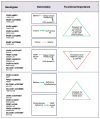Common Genetic Variants Alter Metabolism and Influence Dietary Choline Requirements
- PMID: 28777294
- PMCID: PMC5579630
- DOI: 10.3390/nu9080837
Common Genetic Variants Alter Metabolism and Influence Dietary Choline Requirements
Abstract
Nutrient needs, including those of the essential nutrient choline, are a population wide distribution. Adequate Intake (AI) recommendations for dietary choline (put forth by the National Academies of Medicine to aid individuals and groups in dietary assessment and planning) are grouped to account for the recognized unique needs associated with age, biological sex, and reproductive status (i.e., pregnancy or lactation). Established and emerging evidence supports the notion that common genetic variants are additional factors that substantially influence nutrient requirements. This review summarizes the genetic factors that influence choline requirements and metabolism in conditions of nutrient deprivation, as well as conditions of nutrient adequacy, across biological sexes and reproductive states. Overall, consistent and strong associative evidence demonstrates that common genetic variants in choline and folate pathway enzymes impact the metabolic handling of choline and the risk of nutrient inadequacy across varied dietary contexts. The studies characterized in this review also highlight the substantial promise of incorporating common genetic variants into choline intake recommendations to more precisely target the unique nutrient needs of these subgroups within the broader population. Additional studies are warranted to facilitate the translation of this evidence to nutrigenetics-based dietary approaches.
Keywords: choline; dietary requirements; genetics; nutrigenetics.
Conflict of interest statement
The authors declare no conflict of interest. The funding sponsors had no role in the design of the study; in the collection, analyses, or interpretation of data; in the writing of the manuscript, and in the decision to publish the results.
Figures



References
-
- Buchman A.L., Dubin M.D., Moukarzel A.A., Jenden D.J., Roch M., Rice K.M., Gornbein J., Ament M.E. Choline Deficiency: A Cause of Hepatic Steatosis during Parenteral Nutrition That Can Be Reversed with Intravenous Choline Supplementation. Hepatology. 1995;22:1399–1403. - PubMed
-
- Institute of Medicine (U.S.) Standing Committee on the Scientific Evaluation of Dietary Reference Intakes and its Panel on Folate, Other B Vitamins, Choline . Dietary Reference Intakes for Thiamin, Riboflavin, Niacin, Vitamin B6, Folate, Vitamin B12, Pantothenic Acid, Biotin, and Choline. National Academies Press; Washington, DC, USA: 1998. - PubMed
Publication types
MeSH terms
Substances
Grants and funding
LinkOut - more resources
Full Text Sources
Other Literature Sources

